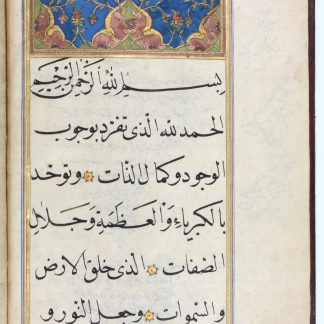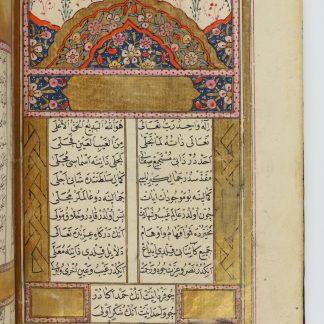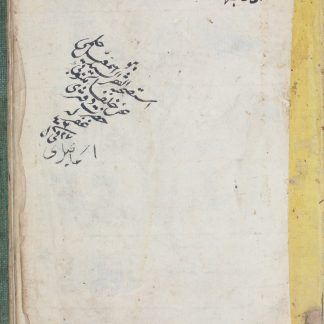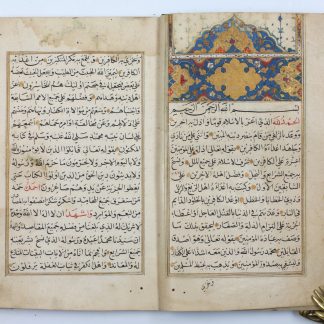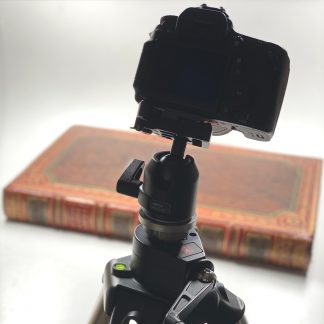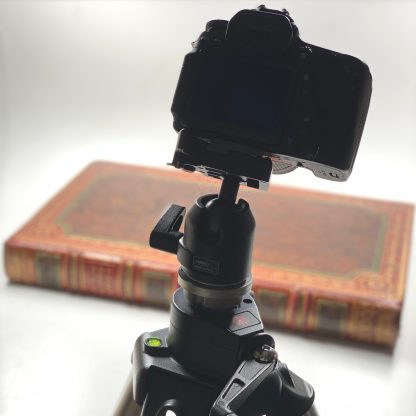
Serh-i Vasiyyetname-i Birgivi.
Small 8vo (140 x 210 mm). 156 ff. (bound with "Jawahir al-Islam", short chapters from catechisms, miscellaneous prayers, and poems). Ottoman Turkish manuscript on polished paper. Black naksh script with important phrases written or underlined in red, ruled in red. Contemporary leather binding with fore-edge flap, decorated in blind with stamps and mandorla.
€ 3.500,00
A charming Ottoman manual of catechisms and prayers popular in 18th century Turkey. The manuscript opens with the standard prayer read after completing the recitation of the Qur'an, followed by a popular catechism known as the "Serh-i Vasiyyetname-i Birgivi", and a shorter yet equally popular catechism, "Jawahir al-Islam". The last part includes copies of various prayers, poems, and short chapters from other catechisms. Each part is written by different hands. The colophon of "Serh-i Vasiyyetname-i Birgivi" is dated 1126 H (1714 CE).
The "Vasiyyetname" was a highly appreciated and widely read book, considered one of the works which for centuries shaped the principles of being a Muslim in Ottoman minds. Many manuscripts, including the present one, record the date of Birgivi's completion of his work as "approximately 970 [1562]". The book's great popularity in the 17th century resulted in the production of commentaries such as the present one. Written by Sheikh Ali Sadrî el-Konevî in 1114 (1702), this commentary proved no less popular than the original work.
The appendix to "Vasiyyetname" is "Jawahir al-Islam", a popular anonymous catechism composed of 34 simple questions and straightforward answers that mostly focus on religious duties. The questions are introduced by the phrase, "Eger sorsalar" ("If they ask you"), written in red ink.
This is followed by "54 Fardh", a short chapter that is found in various catechism books, reciting the fifty-four religious duties in a manner easy to memorize. After a single-page poem written in the style of "murabba" and a few pages of prayers which a person may recite in certain situations, such as to seek protection from evil eye, another popular catechism chapter was added to the manuscript. This short section, "Attributes of Allah", enumerates the adjectives and attributes describing Allah. The manuscript ends with a three-page "qasidah" written by "Muhammed bin Ali Efendi", as recorded in a brief colophon.
Overall, a beautiful example of manuscript tradition, witnessing a collective effort to create a well-rounded, easily accessible manual of prayers and religious rules.
Leaves 1-4: miscellaneous prayers; ff. 5-128: Serh-i Vasiyyetname-i Birgivi; ff. 129-134: Jawahirü'l-Islam; ff. 135-136: 54 Fardh; ff. 137-141: miscellaneous prayers and single-page poem; ff. 142-147: blank; ff. 148-151: attributes of God; ff. 152-153: a qasidah; ff. 154-156: miscellaneous prayers.
Browning and waterstains, ink smudges and foxing throughout. Binding loosened; covers in poor condition with major chipping; spine heavily worn.

